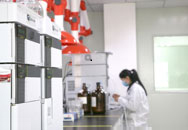

Tel: +86-021-3762 1270
Fax: +86-021-6762 1877
Email: service@genicbio.com
Custom peptide synthesis
1. How do you ship peptides?
All peptides will be shipped as lyophilized powder with desiccant at room temperature.
2. What are the standard delivery times?
Delivery times strongly depend on the scale, purity, order volume and peptide sequence. In general, though, we usually ship crude peptides within 1 week of receiving your order, while delivery times for purified peptides or larger amounts can vary from 2 to 4 weeks.
3. How do I dissolve my peptide?
The solubility of a peptide is highly dependent on its sequence. The best way to reconstitute your peptide is to use either water or buffer. Here are some general tips for dissolving peptides:
- Sonication is often helpful to dissolve the peptide.
- For basic peptides, 10% acetic acid in the solvent will help dissolve peptides.
- For acidic peptides, 10% ammonium bicarbonate will help dissolve peptides
- For peptides with extremely low solubility in aqueous solutions, organic solvents should be used first (such as DMSO, isopropanol, methanol, acetonitrile).
- Peptide sequences containing Cys, Met, and Trp require oxygen free solvents as they are especially prone to oxidation.
- Once peptides are dissolved completely, water may be added slowly until the final concentration has been reached.
4. How to store my peptide?
Peptides are most stable as lyophilized powder and remain viable for a much longer period of time than peptides in solution. Store at cool and dry place and avoid light upon receiving the peptides. Store at -20oC for long-term storage. After dissolving, it is recommended to store the peptide as aliquots at -20oC. Most peptides are stable for years under this condition.
5. What if my peptide can not be delivered on time?
Each peptide has its specific characteristics. If we have difficulties in completing your peptide or some problems happen during the process of synthesis, we will inform you as soon as possible.
6. What is net peptide content and gross peptide weight?
All peptides are delivered as gross weight unless specified. Gross peptide weight includes the weight of the peptide and non-peptide components such as salts, counter ions, residual solvents, and water. Net peptide content is a calculation of merely the peptide present, which is usually 50-80% of the total peptide weight, depending on the purity, sequence and method of synthesis and purification.
7. What is the difference between peptide purity and peptide content?
Peptide purity is the percentage of the target sequence as determined by HPLC. The impurities found in a peptide will include deletion sequences, truncated sequences, and incompletely deprotected sequences. The non-peptide components (moisture, counter ions, salts, etc.) are not considered as impurities, but reduce the actual peptide content by certain percentage. Peptide content only gives information on the percent of peptide versus non-peptide components. It is determined by Amino Acid Analysis, which is available at the special request of the customer.
8. What are the applications of peptide libraries?
Peptide libraries are efficient tools for GPCR ligand screening, protein-protein interaction studies, functional proteomics, nucleic acid binding, enzyme substrate and inhibitor screening, antigen and epitope screening, peptide/protein cross-talk studies, the discovery of signal molecules, and other processes significant to modern drug discovery.
9. What quality control data is provided by GenicBio?
Every peptide is accompanied with its individual Quality Certificate, which contains specific information on the synthesized sequence, purity and amount of peptide together with the mass spectrometric and HPLC analysis. Crude peptides only come with the mass spectrometric analysis.
10. What is the length of the peptides you can synthesize?
GenicBio can synthesize peptides of length up to 150 amino acids.



